
You are reading:

You are reading:
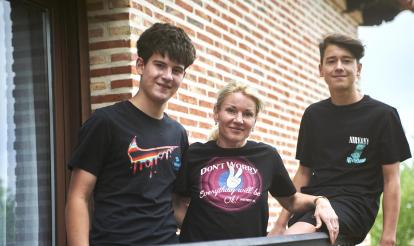
28.01.25
10 minutes readIrina Shumska and her children arrived at the home of Elena, Jesús and Iker in El Molar in 2022. They had fled the Ukrainian city of Odessa after months of shelling. Today, thanks to the Tiende una mano. Acoge programme, these host and hosted people have formed an extended family that has got used to sharing and enjoying life together. “We’d like to stay and live here and, when it’s all over, go to our city for a month to see our friends and family.”
In the Madrid municipality of El Molar -with a population of just over 8,000- brothers Illia and Alosha Shumskii kick the ball around on the pitch of C. D. Molareño. For these teenagers, playing football has been the main tool for integration since they arrived in Spain. It has also helped them to clear their minds and lock away the sound of air-raid sirens and bad memories, if only for a while. Two years ago, their mother, Irina Shumska, took the two boys and their cat, Persik, and with little more than the clothes on their backs, they left Odessa. After a weeks-long ordeal, they arrived in Spain and, thanks to the Asociación Valdeperales and the Tiende una mano. Acoge programme of the ”la Caixa” Foundation, they met Elena Pavón, Jesús Díaz and their 11-year-old son Iker, their host family.
The six of them, plus dog Martin and cat Nube -Persik passed away a year ago- have formed a new family. This is one of the many cases of hosting that have taken place since the Russian invasion in February 2022. In this time, Spain has granted protection to almost 200,000 Ukrainian citizens: more than 60% are women, and over 30% are minors. “What I miss most about Odessa are my friends and the beach. In summer, we would go there every day, from ten in the morning to eight in the evening,” recalls Illia, who will turn 16 at the end of July. His 14-year-old brother Alosha nods in agreement.
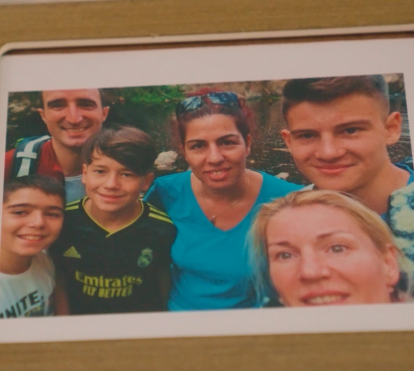
Odessa, a port city in southern Ukraine with nearly a million inhabitants before the invasion, is famous for its coastline, Mediterranean architecture and multiculturalism. “I’d love for the war to end soon and for us all to go to Odessa together, accompany them and see all the things they’ve told us about,” explains Jesús Díaz, a systems technician at a tech company in Madrid, who has become a welcoming “father”.
Carla López, is a social worker with the Asociación Valdeperales, a social organisation that collaborates with the CaixaProinfancia programme which has been working with families and children in vulnerable situations for more than three decades. She acknowledges that the cohabitation and integration of Irina’s family has been a complete success, “because the host family’s commitment has been exceptional. From the very first moment, they’ve been concerned for their wellbeing in El Molar.” But a lot had happened before they arrived there.
Irina, divorced, was a personal trainer at a hotel and also a teacher at a special school for blind children in Odessa. On 24 February 2022, the date the invasion began, the city endured its first Russian air and sea bombardments. From that moment on, the routine of Irina and her two sons was completely disrupted. “For the first four months, the sirens would start blaring when the bombs were approaching and we had to move to the hallway in case some part of the building fell. When we were able to go back to school, every time there was a bombardment we had to go into a bunker,” Illia remembers.
The situation was getting worse. Early one morning, Irina woke her children to tell them they would not be going to school, that the plan was to buy provisions and go to a shelter for an indefinite period. Then, one morning, they packed their bags. “We caught a train and it took us 12 hours to get to the north of Ukraine, to a mountainous area. We slept a bit at the station and at dawn we took a bus to Warsaw, and then a plane to Madrid.”
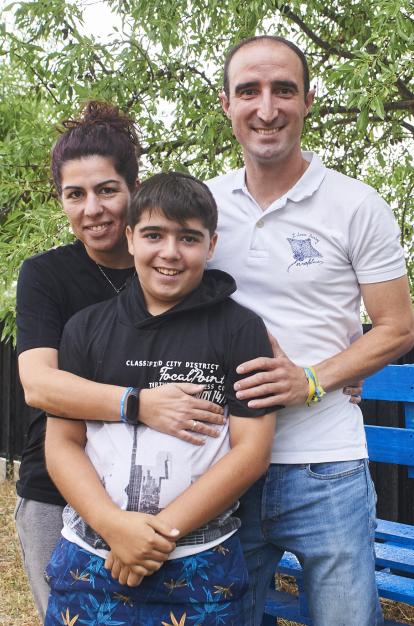
After spending two months at the Reception, Care and Referral Centre for Ukrainian refugees in Pozuelo de Alarcón (Madrid), the emergency programme of the ”la Caixa” Foundation organised the meeting between the two families at the office of the Asociación Valdeperales. “Good vibes are incredibly important,” says the social worker, “but it’s essential to manage nerves and expectations. In that first meeting, we focused on them seeing each other, getting to know each other, asking questions, sharing the rules and habits of living together, schedules and so on... There are a lot of nerves involved.”
And there was chemistry. “I even remember how we were sitting. When it was over, we took the bags, the suitcases and the cat carrier, put everything in the two cars and left for home, which was already prepared to receive them,” says Jesús. For the first five months, their communication tool was the smartphone. “When we sat down to eat, we would all put our mobile phones on the table with the translator app on,” says Irina’s eldest son. That first meal was macaroni with chorizo for both families. Today, Illia and Alosha speak Spanish very well and attend the same school as Iker in Alcobendas, a school that decided to grant them a scholarship until they finish their studies. “At the beginning, Nelia, the support teacher, had her office next to the playground siren and every time it sounded we got scared, it reminded us of Odessa,” Alosha admits.
Irina has found work in her field, as a trainer and instructor at a sports centre in Ciudalcampo, a residential area a few kilometres from El Molar. “I didn’t think about it before, but now I’d like to stay and live in Spain. The main priority now is to look for a flat near Iker, Elena and Jesús. We want to continue sharing and talking,” admits Irina, who has only one wish: “that the war ends and our city and country are rebuilt.”
The two teenagers have eagerly accepted that their immediate future lies here. Alosha wants to become an IT specialist and web developer. “Well, I’d also like to be a footballer.” Illia, on the other hand, wants to be a pastry chef -“to make sweet dishes”- and a business manager, although football also excites him at the moment. They’re both fans of midfielder Mykhailo Mudryk, goalkeeper Andriy Lunin -this season at Real Madrid- and striker Artem Dovbyk, all of whom play for the Ukrainian national team.
“For them, football has been one of the best ways to escape,” Jesús explains. “The Molareño football pitch has become a place where they can be just kids, without having to think about other things like whether they speak Spanish or not... just about the ball and their teammates.”
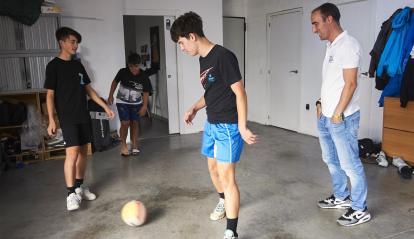
Elena and Jesús will never forget those first images of Ukraine after the Russian invasion. They were shocked to see families leaving their homes and a group of children from an orphanage boarding a Spanish military plane to get out of that hell. “At the beginning of the war, the only thing I knew about Ukraine was that it didn’t belong to the European Union, where it was on the map, what the flag looked like and what the capital city was. Nothing else. But seeing those images made me think that we had plenty of room at home and that we could lend a hand,” says Jesús Díaz, who lives with his family on the outskirts of El Molar, in an area of detached stone and brick houses with land and a garden.
It was then that the Ministry of Inclusion, Social Security and Migration and the ”la Caixa” Foundation set up a website to channel all the reception procedures. The Asociación Valdeperales began the process with Jesús’ family: first an online interview, followed by conversations to find out if they wanted to go ahead, and finally a more personal visit. “They told us we were suitable and we were put on standby. When they explained that it was a mum with two teenagers, we thought it was a complicated age.” But everything has turned out better than they expected.
Valdeperales is one of the partner organisations of the Tiende una mano. Acoge programme, launched by the ”la Caixa” Foundation to support the inclusion of refugees in Spain. This programme is currently being implemented in Barcelona and Madrid, and offers these families fleeing conflicts in their countries the opportunity to live with Spanish families for six months, as a preliminary step to their full integration into society. The Asociación Valdeperales has successfully facilitated the hosting of 60 Ukrainian families and has now begun this work with refugees from other countries.
“Our intention was for this hosting experience to be more than just giving them a room to sleep in. From day one we’ve tried to do everything together. We’ve gone from being three to six, and we do everything as a group. Being here and staying on our own doesn’t make sense. So we decided to eat together, go to a birthday party together, take trips together...”. Jesús is aware that Irina, Illia and Alosha did not have to be happy all the time. “They could be angry at life; they’re not here as tourists and their discomfort would be understandable. But one day I saw they were relaxing, sitting on the sofa. They realised we wanted to support them and that we were there to make things easier for them.”
The one who felt the strangest at first was Iker. “I didn’t want anyone to come to the house, especially if they were babies, they make a lot of noise. When they told me they were a bit older than me, I said ‘OK’. Now we get on really well, with the normal squabbles, as would happen with any brothers. Plus, I’ve learned what it’s like to have siblings, because I’m an only child.”
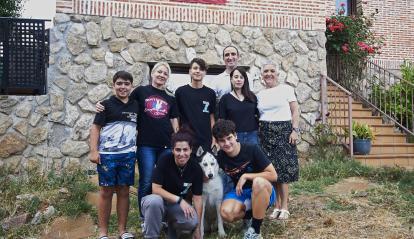
Carla López of the Asociación Valdeperales admits that the adaptation phase is the most complicated. “It usually lasts a couple of months and is when the families get to know each other, see each other’s routines, what things they agree on and what they agree on less. Host families are usually very eager to help, they want everything and they want it now, and we often have to act as a brake. The most important thing is that people who have fled a war feel safe and comfortable. Not much more is needed,” she explains.
This summer they will all take a plane to spend a few days in Tenerife. Illia and Alosha will see the sea again and play ball on the sand with Iker. “I’d like to stay in Spain and go back to Odessa for a month each year to see my uncle, my grandmother and my friends,” says Illia, while glancing at Tik Tok, where he makes funny videos with his three best friends, two Spanish boys and one Peruvian.
Two years after landing in El Molar, the fear has given way to calm and serenity. The two Ukrainian brothers are still surprised by the local village fiestas, travelling by metro, the friends, the food. They love Spanish omelette and paella. “It hasn’t been easy, but we have to live, have a normal life and move forward,” admits Irina, smiling proudly at her sons. Their next mission: to find a flat near Elena, Jesús and Iker’s house. “We want to be close so we can continue talking and sharing. It’s difficult, but we want to stay by their side.”